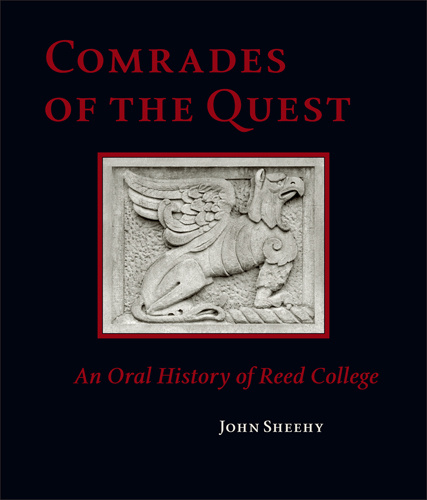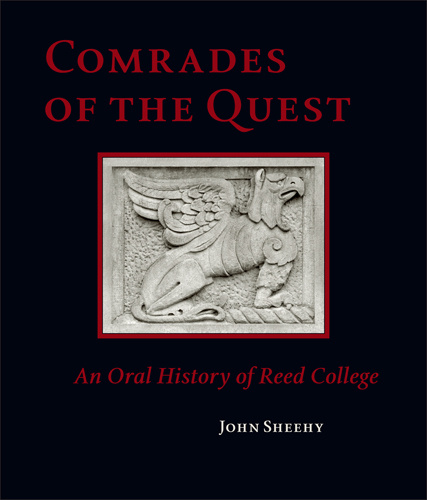“The Ideal College is a college free to pursue its mission with unobscured vision of the truth, and power to proclaim the truth without fear or favor of politicians, or religious sects, or benefactors, or public cries, or its own administrative machinery.” —William Trufant Foster
Visionary. Iconoclast. Rebel. William Trufant Foster set out in 1911 to launch the “ideal college,” and succeeded in building an intellectual liberal arts powerhouse that over the next century would perpetually seek to break the hard crust of custom and orthodoxy. Foster’s quest for excellence and truth generated a steady yield of students—ranging from poet Gary Snyder to muckraker Barbara Ehrenreich to Apple founder Steve Jobs—who left Reed College eager to challenge society’s dominant paradigms.
Comrades of the Quest chronicles the colorful cultural and social history of this band of young, iconoclastic West Coast intellectuals, and of the institution that nurtured them. Drawing from interviews with more than 1,400 people and from unpublished memoirs stretching back to the college’s early decades, John Sheehy weaves together a riveting story told from first-hand perspectives of this unique community’s early formation and its ongoing quest to bring Foster’s vision to life.
With a punch much mightier than its weight, the Reed community undertakes an arduous journey through the political and educational developments of the past century—from the progressive education movement in the 1910s, the general education programs between the two world wars, scientific methodology in the 1950s, political relevance in the 1960s, theories of structuralism and deconstruction in the 1970s, the cultural wars in the 1980s, political correctness in the 1990s, to ideological bias in the 2000s—while keeping its founding ideals largely intact.
At a time when America is struggling to sustain its innovative edge, Reed College remains an iconic model in equipping students with the most rigorous set of skills and attitudes possible for questioning status quo thinking in a rapidly changing world. Its story, populated with a rich cast of characters, and marked by intense rigor, demanding social freedom, and unconventional creativity, is no customary college history, but rather an intellectual thriller of American idealism played out against the hard world of social, religious, and political conformity, to great heights and near-fatal confrontations.
Visionary. Iconoclast. Rebel. William Trufant Foster set out in 1911 to launch the “ideal college,” and succeeded in building an intellectual liberal arts powerhouse that over the next century would perpetually seek to break the hard crust of custom and orthodoxy. Foster’s quest for excellence and truth generated a steady yield of students—ranging from poet Gary Snyder to muckraker Barbara Ehrenreich to Apple founder Steve Jobs—who left Reed College eager to challenge society’s dominant paradigms.
Comrades of the Quest chronicles the colorful cultural and social history of this band of young, iconoclastic West Coast intellectuals, and of the institution that nurtured them. Drawing from interviews with more than 1,400 people and from unpublished memoirs stretching back to the college’s early decades, John Sheehy weaves together a riveting story told from first-hand perspectives of this unique community’s early formation and its ongoing quest to bring Foster’s vision to life.
With a punch much mightier than its weight, the Reed community undertakes an arduous journey through the political and educational developments of the past century—from the progressive education movement in the 1910s, the general education programs between the two world wars, scientific methodology in the 1950s, political relevance in the 1960s, theories of structuralism and deconstruction in the 1970s, the cultural wars in the 1980s, political correctness in the 1990s, to ideological bias in the 2000s—while keeping its founding ideals largely intact.
At a time when America is struggling to sustain its innovative edge, Reed College remains an iconic model in equipping students with the most rigorous set of skills and attitudes possible for questioning status quo thinking in a rapidly changing world. Its story, populated with a rich cast of characters, and marked by intense rigor, demanding social freedom, and unconventional creativity, is no customary college history, but rather an intellectual thriller of American idealism played out against the hard world of social, religious, and political conformity, to great heights and near-fatal confrontations.
‘Comrades of the Quest is as dramatic as the best of fiction, beginning with a complex and doomed central character —William Trufant Foster, the 31-year-old visionary idealist and first president of Reed College. It’s a great story, brilliantly constructed and told from multiple and brief, always shifting, points of first-person view. The story never lags.’—Robin Cody, author of Ricochet River and Another Way the River Has
Clearly and logically organized, each chapter moves with a sort of free association style, with one subtopic overlapping and blending into the next, which makes page-turning reading. In the process, we get a compelling portrait of cultural radicals and intellectual conservatives interacting to mold the history of a fascinating educational institution whose wide influence has far outweighed its small size.’—Carl Abbott, author of Portland in Three Centuries
A great book that skillfully weaves hundreds of disparate oral histories into a coherent historical account.’
— Michael Munk, author of The Portland Red Guide
The book is almost impossible to put down.’
— Porter Abbott, author of The Cambridge Introduction to Narrative
Not only provide rich pleasure to those who know the place from the inside but could well serve as a model document for all those interested in the history of American higher education.’
— Roger Porter, author of Bureau of Missing Persons: Writing the Secret Lives of Fathers
Not just a great history of the college, but an amazing trip through American social history . . . . A remarkable piece of work.’
—John Kroger, author of Convictions
John Sheehy is a writer and publisher who has worked as an executive or consultant with a number of companies, ranging from independents like Utne Reader, Parabola, Afar, Dwell, Inc., and Fast Company, to media giants like Time, Inc., Bertelsmann, and Reader's Digest. A graduate of Reed College, he and his wife live in Sonoma Country, California. Comrades of the Quest is his first book.





